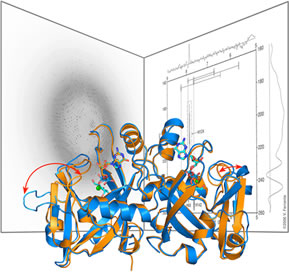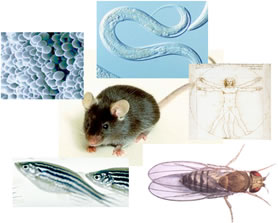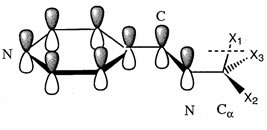 Lab Rotations
Lab Rotations
During the first year, each student carries out research in three different laboratories. To help students become familiar with the many different research opportunities in BCMB, faculty give short research presentations throughout September, and a BCMB program retreat is held in early October.
Students have the opportunity to present one talk and one poster on two of their three rotation projects at our semi-annual Rotation Presentations. At the end of the three rotations, each student selects a laboratory for thesis work.
Foundations of Modern Biology
Students are required to complete (or place out of) all courses of the Foundations of Modern Biology core curriculum:
Computational Biology Bootcamp: This intensive one week class is meant to immerse students in computation, and to provide them with the foundational tools to be able to apply modern computational techniques and appropriate statistics to their data. Students learn how to work in a command line shell and different “notebook” style computing skills including Jupyter and Rmarkdown. Throughout the course, students apply these skills to different practical analysis problems for exploratory data analysis, visualization, and interpretation. The presented problems run the gamut from biophysics to cellular and systems biology to genomics.
Analyses of Macromolecules: Energetics, Structure and Function: The course will cover (1) macromolecules, (2) physical chemical principles dictating their biological behavior, and (3) methods to study them. Macromolecular interactions and functions are interpreted through a framework that combines theoretical concepts with experimental illustrations thereof. Key methods include: X-ray crystallography, nuclear magnetic resonance, cryo-electron microscopy, mass spectrometry, absorption and emission spectroscopies, hydrodynamic methods, and single-molecule approaches. Lectures will focus on practical applications of the methods, experimental design, data collection, and elementary aspects of data analyses.
 Organic Mechanisms in Biology: This course deals with the chemical mechanisms of enzymes. It is intended to illustrate how catalysis in biological systems can be understood using principles derived from organic reaction mechanisms.
Organic Mechanisms in Biology: This course deals with the chemical mechanisms of enzymes. It is intended to illustrate how catalysis in biological systems can be understood using principles derived from organic reaction mechanisms.
Molecular Biology and Genomics: This course covers the Molecular Biology and Genomics of both prokaryotes (using E. coli as the model organism) and eukaryotes, with a focus on “model organisms” including yeast, flies, worms, mice as well as humans. Both the Molecular Biology (reductionist) perspective and the Genomics (systems biology) perspective will be provided on each topic, and there will be heavy emphasis on mechanism and regulation of fundamental processes in biological information transfer DNA->RNA-> protein. This course will cover genes and genomes, transcription and RNA world, replication, chromosome structure and function and genome instability.
Principles of Genetics: This course uses active learning to teach the foundational principles of genetics spanning from basic Mendelian genetics to human inheritance. Team-based in-class discussions focus on experimental design and interpretation using traditional and modern (CRISPR-Cas9 based) tools. These tools are explored within the context of several model systems including yeast, bacteria, round worms, fruit flies, and mice. The goal is to enable students from a wide range of backgrounds to all think like geneticists.
Cell Structure and Dynamics: The objective of this course is to provide the basics of cell biology, including the structure, function and biogenesis of cellular organelles. Also covered are essential concepts on the cytoskeleton, cell division, cell cycle and cell death, cell-cell and cell-extracellular matrix interactions, autophagy, and protein turnover.
Pathways and Regulation: This course will cover the principles of membrane transport, bioenergetics, and metabolic pathways with particular emphasis on regulatory mechanisms including receptor-mediated signaling, small GTPases, lipid molecules, kinases and phosphatases.
Quantitative Biology Lab: These weekly sessions are integrated with the above courses. They provide hands-on work to reinforce and further develop computational concepts and problems students learn didactically in the corresponding course sessions. Experimental design, and concepts of rigor and reproducibility will also be emphasized.
The above core courses are completed in the first three quarters of the academic year (Sept. – March).
Core Discussion
Core Discussion is a small-group discussion of relevant literature that corresponds to the core course lectures.
 First Year Electives
First Year Electives
In the fourth quarter (March-May), first year students take two short elective courses, in addition to the Method, Logic, & Experimental Design and the BCMB Responsible Conduct of Research course (see below).
Students begin to focus on a research area of interest through choosing these electives. Courses are offered in Neurobiology, Developmental Biology, Molecular Immunology, The Cytoskeleton, Transcription Mechanisms, Computational Genomics Methods, Microbial Pathogenesis, etc.
MD/PhD and MSTP students doing their PhD research in the BCMB program are exempt from the first year electives requirement. However, they are required to complete two elective courses of their choice during their BCMB tenure.
Method, Logic, & Experimental Design Course
Students meet in small groups with faculty members to read and discuss current research articles. The goal is to learn to critically evaluate experiments, results and to design controlled experiments.
BCMB Responsible Conduct of Research
First year BCMB students complete research ethics training in a variety of formats. The School of Medicine requires online training in certain areas such of conflict of interest, scientific misconduct, and HIPPA compliance. BCMB has a spring course just for first year students, “BCMB Responsible Conduct of Research.” Topics include Issues of Diversity, Mentoring, Misconduct/Fraud, Authorship Issues, Conflict of Interest, Scientific Record Keeping, and Animal and Human Experimentation.
